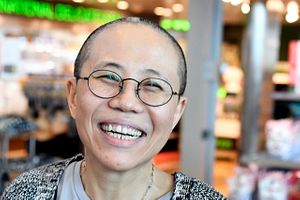Amid the U.S.-China trade war, Chinese Premier Li Keqiang arrived in Germany on July 8 and met with German Chancellor Angela Merkel. During Li’s visit, both countries signed deals vowing to “oppose protectionism and safeguard free trade system.” Meanwhile, Liu Xia, widow of Nobel Peace Prize winner Liu Xiaobo, was finally allowed to leave China for Germany.
As the United States on July 6 officially launched “the biggest trade war ever in economic history” (as China’s Commerce Ministry referred to it), China’s financial markets have been experiencing serious fluctuations. The top — and probably the only — priority for Li’s visit to Germany this time was to discuss the critical trade issue with Merkel.
Based on a series of lengthy statements issued by both China’s state news agency, Xinhua, and China’s foreign ministry, China achieved fruitful results on trade with Germany.
China and Germany on July 9 agreed to “promote bilateral cooperation in economy, trade and investment, jointly safeguard free trade and an international market based on fair and recognized rules and relax market access,” said Xinhua.
Specifically, both sides plan to strengthen cooperation on digitization, autonomous driving, artificial intelligence, new energy vehicles, and scientific and technological innovation — the items that the U.S. government aims to hit the hardest via its trade war, which targets advanced technologies that are the focus of the “Made in China 2025” plan.
In addition, both countries signed a series of cooperation deals on agriculture, education, health care, telecommunications, and the chemical and automobile industries.
Xinhua quoted Merkel as saying that “Germany opposes trade wars and advocates free trade based on rules.”
Li said that China will cooperate with Germany “in the spirit of mutual respect, equality, mutual understanding and accommodation as well as fair competition to better achieve win-win results,” according to China’s foreign ministry.
In order to achieve all those trade goals, China apparently made concession on human right issues this time.
At around 11 am on July 10 in Beijing, Liu Xia was allowed to board a Finnair plane leaving China for Germany, BBC Chinese reported. Her late husband, Liu Xiaobo, died of cancer in July 2017 after spending more than eight years in prison for his advocacy of human rights in China. Liu Xia, though never formally charged with a crime, had been under strict house arrest.
Although China’s media has remained silent about the news, Liu Xia’s brother Liu Hui – who remains in Beijing – confirmed this information on his WeChat, according to Ming Pao. He wrote:
My sister left Beijing to fly to Europe at noon, to start her new life. I’m grateful for those who cared about her and helped her all these years. I hope that our parents and my brother-in-law [Liu Xiaobo] could rest in peace now and keep blessing her [from heaven]. May her future life be peaceful and joyful. Thank you all. Here I Bow.
As The Diplomat noted earlier, Liu Xia was reportedly on the verge of a breakdown during her house arrest in Beijing. In early May, Liu told her friend during a phone conversation: “Now, I’ve got nothing to be afraid of. If I can’t leave, I’ll die in my home.”
Merkel had paid a visit to China in late May. During this visit, Merkel had reportedly pressed China on human rights — particularly about the case of Liu Xia. The German chancellor was thus seen as Liu’s “biggest hope.” Now Merkel’s efforts have paid off.
To avoid China’s fierce online censorship, a number of Chinese netizens subtly paid their respects to Merkel as well as to Germany by writing a short thank you note on their Weibo accounts, without mentioning Liu Xia’s name.

































